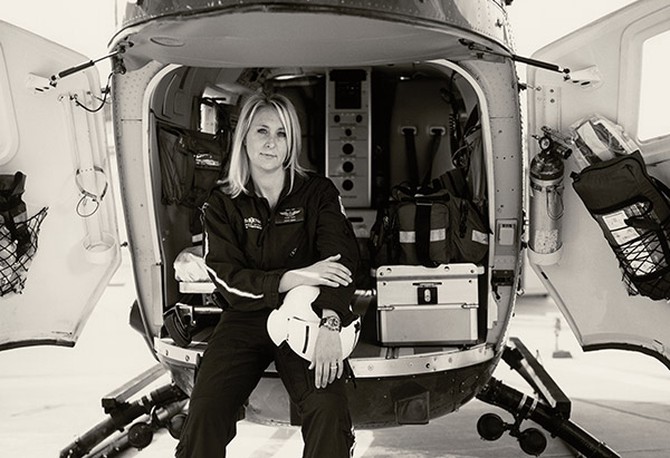What the Most Caring People in the World Know
For The American Nurse Project, filmmaker Carolyn Jones set out to interview nurses around the country about their work, and ended up talking about life, death and things that matter to all of us.
By Corrie Pikul
They Understand How Hard It Is to Feel Helpless
Venus Anderson, BSN, CFRN
Nebraska Medical Center / Lifenet in the Heartland, Omaha, Nebraska
In addition to working in a pediatric ICU at Children's Hospital in Omaha, Venus Anderson is a member of a select group of about 5,000 flight nurses currently working in the U.S. She picks up patients who are critically ill or injured and transports them via helicopter to the nearest trauma center.
"My father was in a motorcycle accident four years ago. He lived in rural Iowa, and he was very badly injured. Another flight team went out to get him, but he didn't survive, and that shook my whole foundation. When I came back to work, everything seemed more personal to me. I used to not want to know the name of the patient or make it personal in any way when we picked someone up in the helicopter. I thought it made it easier to pick them up and then drop them off if I didn't make any emotional connection. But after my dad died, I started making it a point to talk to the families before we took off. I take two minutes to say, 'My name is Venus, and I'm going to be flying your loved one to Omaha. Can I get your phone number? When we get there, I'll call you and let you know how it went.' I make sure they come into the helicopter to give their loved one a kiss good-bye or say whatever they want to say to him or her. I realized that one thing that killed me was not knowing what was going on with my dad during the process. I don't think this gesture is a waste of time anymore."
Nebraska Medical Center / Lifenet in the Heartland, Omaha, Nebraska
In addition to working in a pediatric ICU at Children's Hospital in Omaha, Venus Anderson is a member of a select group of about 5,000 flight nurses currently working in the U.S. She picks up patients who are critically ill or injured and transports them via helicopter to the nearest trauma center.
"My father was in a motorcycle accident four years ago. He lived in rural Iowa, and he was very badly injured. Another flight team went out to get him, but he didn't survive, and that shook my whole foundation. When I came back to work, everything seemed more personal to me. I used to not want to know the name of the patient or make it personal in any way when we picked someone up in the helicopter. I thought it made it easier to pick them up and then drop them off if I didn't make any emotional connection. But after my dad died, I started making it a point to talk to the families before we took off. I take two minutes to say, 'My name is Venus, and I'm going to be flying your loved one to Omaha. Can I get your phone number? When we get there, I'll call you and let you know how it went.' I make sure they come into the helicopter to give their loved one a kiss good-bye or say whatever they want to say to him or her. I realized that one thing that killed me was not knowing what was going on with my dad during the process. I don't think this gesture is a waste of time anymore."
Published 08/08/2013


